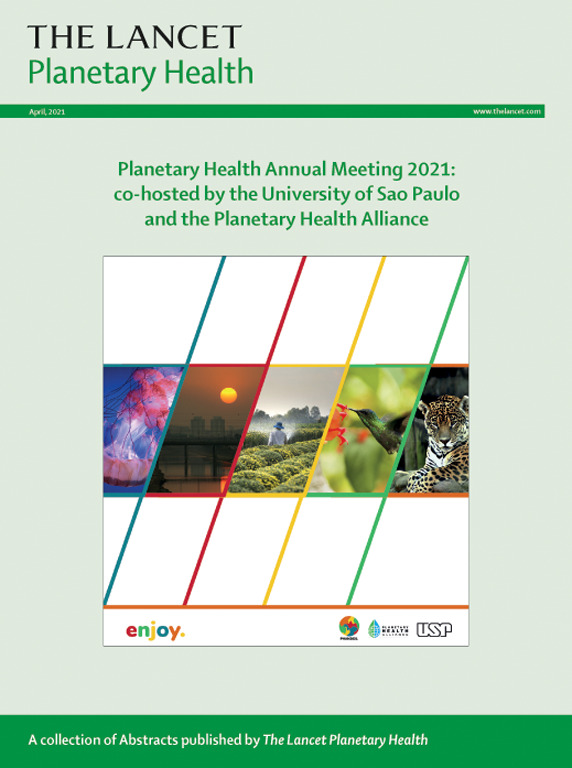Impact of tree-based interventions in addressing health and wellbeing outcomes in rural low-income and middle-income settings: a systematic review and meta-analysis
IF 24.1
1区 医学
Q1 ENVIRONMENTAL SCIENCES
引用次数: 0
Abstract
The impact of nature-based solutions on human health is increasingly recognised; however, our understanding of the strength of evidence and the extent to which it supports policy and practice is insufficient. We aimed to assess the health and wellbeing impacts of solutions in low-income and middle-income settings in which trees are a central feature in the protection, restoration, and sustainable management of landscapes. For this systematic review and meta-analysis, we searched Web of Science, Embase, APA PsycInfo, MEDLINE ALL, Global Health, Global Index Medicus, GreenFILE, SciELO, EconLit, and Africa-Wide Information for studies that evaluated the impacts of relevant interventions on health and wellbeing. Searches were limited to records published from Jan 1, 2000, to the search date; an initial search was conducted on Nov 23, 2021, and was updated on Feb 27–28, 2023. We extracted data from studies comparing interventions with matched controls, calculated standardised mean differences, and pooled the effects using random-effects meta-analysis with adjustments for potential effect dependence. Studies were assessed for quality using seven risk-of-bias domains. Our search identified 23 402 studies, of which 54 were included in the meta-analysis. We found significant positive pooled effects for agricultural yields (standardised mean difference 0·41 [95% CI 0·11 to 0·70]), dietary diversity (0·10 [0·02 to 0·18]), total household income (0·21 [0·09 to 0·33]), poverty reduction (0·17 [0·07 to 0·27]), child growth (0·11 [0·00 to 0·22]), and self-reported wellbeing (0·21 [0·00 to 0·43]). Loss of income from timber production could be a negative outcome (−0·13 [−0·29 to 0·02]); however, these effects might be partially offset by increased income from non-timber forest products (0·32 [0·04 to 0·61]). Effects varied substantially by intervention type, with more positive effects associated with interventions in which the primary target was livelihood improvement than with interventions that targeted biodiversity or carbon mitigation. However, cautious interpretation is urged owing to the low certainty of the evidence. In conclusion, evidence suggests that tree-based solutions can support the health and wellbeing of the implementing communities. Such evidence strengthens the case for aligning health objectives with the goals of nature-based solutions by making community wellbeing an integral component of conservation programmes. Future studies should examine a wider range of outcomes that have direct relevance for health.
基于树木的干预措施对解决农村低收入和中等收入环境中健康和福祉结果的影响:系统回顾和荟萃分析
基于自然的解决办法对人类健康的影响日益得到承认;然而,我们对证据的力度及其支持政策和实践的程度的理解是不够的。我们旨在评估解决方案在低收入和中等收入环境中的健康和福祉影响,在这些环境中,树木是景观保护、恢复和可持续管理的核心特征。在这项系统综述和荟萃分析中,我们检索了Web of Science、Embase、APA PsycInfo、MEDLINE ALL、Global Health、Global Index Medicus、GreenFILE、SciELO、EconLit和Africa-Wide Information,以评估相关干预措施对健康和福祉的影响。检索仅限于从2000年1月1日至检索日期发布的记录;初步搜索于2021年11月23日进行,并于2023年2月27日至28日进行了更新。我们从比较干预措施与匹配对照的研究中提取数据,计算标准化平均差异,并使用随机效应荟萃分析合并潜在效应依赖性。使用七个偏倚风险域评估研究的质量。我们的检索确定了23402项研究,其中54项纳入了meta分析。我们发现农业产量(标准化平均差为0.41 [95% CI为0.11至0.70])、膳食多样性(0.10[0.02至0.18])、家庭总收入(0.21[0.09至0.33])、减贫(0.17[0.07至0.27])、儿童生长(0.11[0.000至0.22])和自我报告的幸福感(0.21[0.000至0.43])具有显著的正汇总效应。木材生产的收入损失可能是负面结果(- 0.13[- 0.29至0.02]);然而,这些影响可能会被非木材林产品收入的增加部分抵消(0.32[0.04至0.61])。影响因干预类型而异,以改善生计为主要目标的干预措施比以生物多样性或减少碳排放为目标的干预措施产生的积极影响更大。然而,由于证据的不确定性,必须谨慎解释。总之,证据表明,基于树木的解决方案可以支持实施社区的健康和福祉。这些证据加强了将健康目标与基于自然的解决办法的目标结合起来的理由,使社区福利成为保护方案的一个组成部分。未来的研究应检查与健康直接相关的更广泛的结果。
本文章由计算机程序翻译,如有差异,请以英文原文为准。
求助全文
约1分钟内获得全文
求助全文
来源期刊

Lancet Planetary Health
Multiple-
CiteScore
28.40
自引率
2.30%
发文量
272
审稿时长
8 weeks
期刊介绍:
The Lancet Planetary Health is a gold Open Access journal dedicated to investigating and addressing the multifaceted determinants of healthy human civilizations and their impact on natural systems. Positioned as a key player in sustainable development, the journal covers a broad, interdisciplinary scope, encompassing areas such as poverty, nutrition, gender equity, water and sanitation, energy, economic growth, industrialization, inequality, urbanization, human consumption and production, climate change, ocean health, land use, peace, and justice.
With a commitment to publishing high-quality research, comment, and correspondence, it aims to be the leading journal for sustainable development in the face of unprecedented dangers and threats.
 求助内容:
求助内容: 应助结果提醒方式:
应助结果提醒方式:


